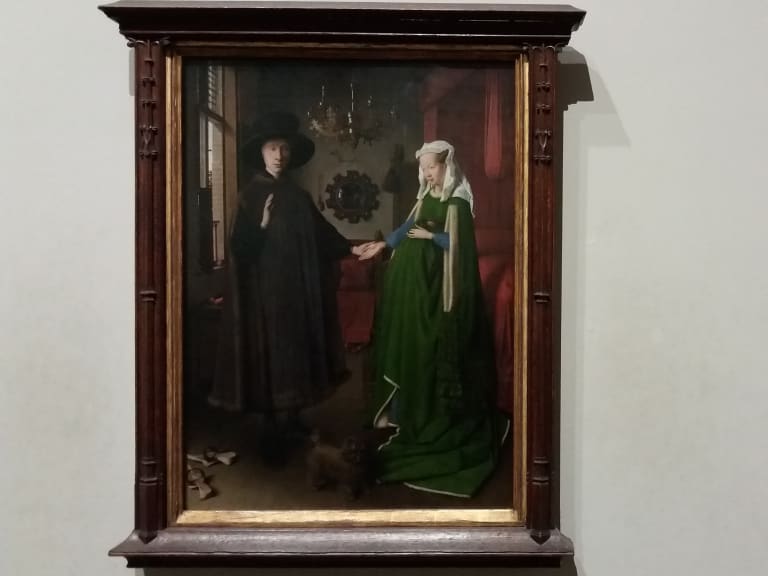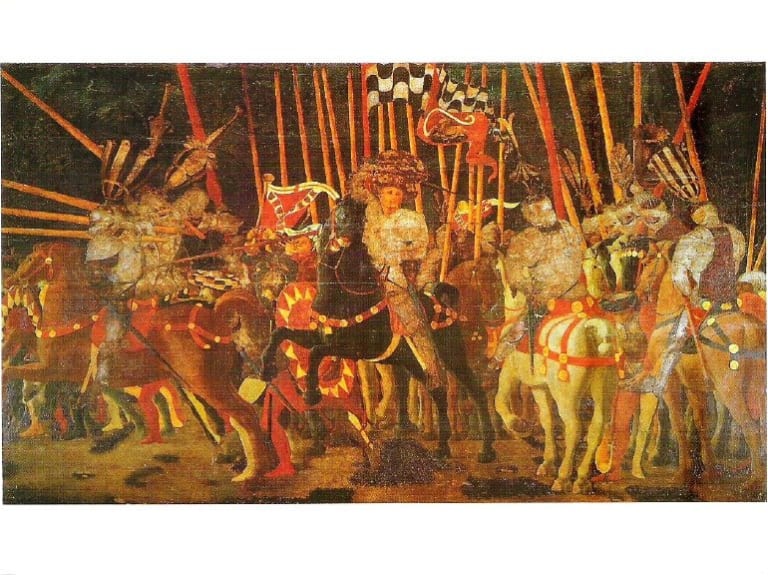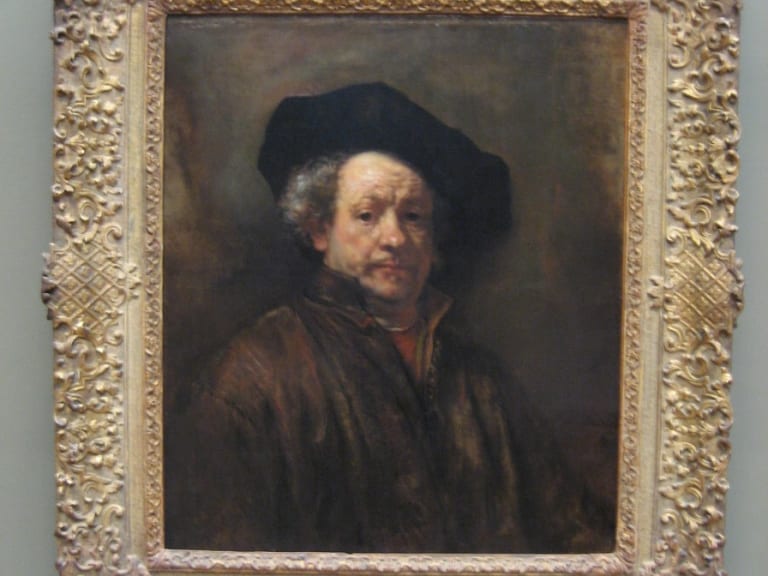More about: 12 Best Paintings of the National Gallery of London
Are you an art lover? Titian's Bacchus and Ariadne, Velázquez's Venus in the Mirror, Van Gogh's The Sunflowers, Rembrandt's Self-Portrait, Turner's Temerary Combatant, as well as 2,300 other paintings and frescoes are currently on display at the National Gallery in London.
Founded in 1824 with just 38 paintings, it became the true jewel in the crown with its remarkable representation of the best from the 13th to the 20th century on English soil. But what are its best works? In this publication I share with you the top paintings that you cannot miss, according to the specialists, ordered by their year of creation. Let's get to it!
1. "The Arnolfini Marriage" by Jan van Eyck, 1434

This masterpiece by Jan van Eyck is one of the most enigmatic pieces in the history of art. It is not just any portrait, it is a masterpiece! And with a busy history of travel, theft and looting. It was Ferdinand VII who recovered it and gave it to England.
This painting, which you will have the opportunity to see if you book your guided tour of the National Gallery in London, has hundreds of interpretations of its symbolism and is one of the most convincing depictions of people of the time, in the bosom of their home. The painting is one of the jewels of the 30 most famous museums in the world.
- Location: room 28.
- Why it stands out: for its light, shadow and meticulous attention to detail.
- Curiosity: Full-length portraits were rarely painted in the 15th century.
2. "The Battle of San Romano' by Paolo Uccello, 1440

Paolo Uccello was a Renaissance painter known for his use of perspective and foreshortening, as well as his ability to capture intricate detail in his paintings. This is evidenced by this work, which you can see on a guided tour of the National Gallery in London
. It is one of the 100 best paintings in London according to TimeOut. The three panels depicting the battle were supposedly commissioned by the Medici family, who had them in their possession until the last days of Lorenzo de Medici in 1492.
- Location: Room 54.
- Why it stands out: Tolentino's horse was painted in such detail that it appears to be charging towards the viewer.
- Curiosity: depicts a battle between Florentine and Sienese soldiers.
3. "The Doge Leonardo Loredan" by Giovanni Bellini, 1501

On your guided tour of the National Gallery in London you will also see one of the most important works of the Italian Renaissance. Painted in 1501, when Venice was at the top of the European capitals and the Bellinis were conquering the art scene.
The painting portrays the Doge or "supreme magistrate" of the oligarchy that ruled Venice. The man's features are immobile and reflect all-powerful Roman traits. The light illuminates the entire surface, especially the ostentatious damascenes of gold and silver thread from the Turkish land. If you approach the painting you will appreciate the different layers of oil paint that make up its relief.
- Location: Room 62.
- Why it stands out: The play of light and shadow.
- Curiosity: It is a perfect example of the union between art and power of that period.
4. Raphael's "Madonna of the Carnations", 1507

On your guided tour of the National Gallery in London you will also admire this composition inspired by a work by Da Vinci entitled Madonna Benois. Rated as one of the 10 must-see works in the National Gallery in London by the specialists of Art & Auctions.
In this painting, Raphael Sanzio depicts the Virgin Mary young and beautiful, with a relaxed expression as a symbol of her closeness to humanity. She wears an elegant dress with wide sleeves and a fur cloak over her shoulders. The Virgin's right hand rests on her lap and she holds a carnation or rosebud in front of her breast.
- Location: Room 8.
- Why it stands out: One of the most important surviving works of this passage.
- Curiosity: Some people know this painting as 'The Virgin of the Roses'.
5. "The Virgin of the Rocks' by Leonardo da Vinci, 1508

On your visit to the National Gallery, you will also see this mystical painting. There are two works of the same name. The first one dates from 1486 and is on display in the Louvre Museum. The second (this one) was painted a decade later. According to the curators, the central narrative of the painting revolves around a pale-skinned Virgin who has just emerged from a cave, but there are two theories:
- The first points to the Virgin blessing humanity as she emerges from those walls.
- The second leans towards a more humanistic view, following Plato's myth of the cave.
Which theory is correct? Well, it is one of the many enigmas to be deciphered in the Da Vinci Code.
- Location: room number 9.
- Why it stands out: It is in the top 20 of the most visited paintings in the National Gallery in London.
- Curiosity: there is a possibility that Giovanni Ambrogio de Predis, Da Vinci's assistant, may have been the material author of the work.
6. "Bacchus and Ariadne" by Titian Vecellio, 1523

One of the National Gallery's must-sees for children is this stunning oil painting depicting Bacchus, the Roman god of wine, and his madness in search of his lost lover, Ariadne. The painting is part of a series of frescoes and mythological paintings for the Camerino d'Alabastro.
On the left side, the skilful painter recreates the mythological origin of the Boreal Constellation, given that Zeus's wedding gift was to turn the bride's crown into this grouping of stars.
- Location: room number 10.
- Why it stands out: Harmony of colour.
- Curiosity: It was created in 1523 for Alfonso I of Este, Duke of Ferrara.
7. "Self-portrait" by Van Rijn Rembrandt,1640

Van Rijn Rembrandt was at the height of his career when he painted Self Portrait at the age of 34. He was the most celebrated painter in the Netherlands and was rubbing shoulders with exclusive social circles.
The artist depicts a nobleman of high status, imposing character, vast wealth and the power that came with his artistic and humanistic gifts, although we cannot overlook the fact that fortune smiled on him after his marriage to his cousin Saskia.
Rembrandt was a specialist in portraying the traditions of high society, particularly in group portraits.
- Location: Room 23.
- Why he stands out: His contribution to Baroque art is acclaimed on the international scene, as confirmed for example by the famous sculptor Auguste Rodin.
- Curiosity: 29 years later, after Saskia's death, in her "Self-Portrait at 63", the imprint is far from the original.
8. "Venus in the Mirror by Diego Velázquez, 1651

Who is the woman in the painting? Experts have not deciphered the enigma exactly, but what is certain is that the work you will see on your visit to the National Gallery belongs to the Spanish master of Baroque painting, Diego Velázquez.
The Venus in the Mirror is one of the most interesting paintings dedicated to femininity, painted, perhaps, during the artist's second trip to Italy. The artist had little interest in the face of this goddess as he moved brushstroke after brushstroke across the "Rokeby". In essence, it was feminine beauty that he wished to portray.
- Location: Room 30.
- Why it stands out: This is the only surviving nude by the Sevillian painter.
- Curiosity: The personification of love seems to follow among her curves.
9. "Young Woman Seated Before the Virgin by Johannes Vermeer, 1672

The translation of this painting that you will see on your visit to the National Gallery is quite controversial. Some call it Young Lady Standing before a Spinet, others Young Lady Standing before the Spinet, also Young Woman Seated before the Virginal or Lady Seated at the Virginal.
The master of light and silence is known for his use of colour, the serenity of his works, as well as his work with light and shadow, as in this case, where he consciously reduced his palette to contrast the textures.
This painting is one of the top 20 most visited works in the National Gallery in London according to the gallery's report.
- Location: Room 25.
- Why it stands out: It is an excellent example of Dutch Golden Age painting.
- Curiosity: Johannes Vermeer's most famous painting is The Girl with the Pearl Earring, as portrayed by Scarlett Johansson and Colin Firth in the 2003 film of the same name.
10. John Constable's "The Hay Wain", 1821

Constable's exquisite depiction of a scene between Suffolk and Essex shows why he is regarded as one of the forerunners of Impressionism.
Despite his revolutionary vision and the gold medal he won in Paris for this painting, it was a hundred years before the detail of Constable's work was appreciated.
- Location: Room 34.
- Why it stands out: The detail.
- Curiosity: It took second place as the most beautiful painting in the National Gallery, London.
11. William Turner's "The Daredevil", 1839

This painting, which you can admire on a visit to the National Gallery, is a stunning example of Joseph Mallord William Turner' s mastery of light and colour. The scene is of a sunset against the backdrop of a sky so blurred that it almost seems like an illusion. In the best Romantic style, this expert landscape painter records in his work the glory days of sailing ships, while recalling the end of their golden age.
The ship being towed up the Thames is called The Daredevil, and arrives at its destination to be scrapped after the Battle of Trafalgar in 1805. The tugboat towing it has a dark silhouette in the foreground, and the artist did not intend to make an exact replica of the original, as the intention was to reflect the nostalgia and loss caused by the transition from the agricultural era to the Industrial Revolution.
- Location: room number 34.
- Why it stands out: light and colour
- Curiosity: on the eve of the celebration of the 200th anniversary of the National Gallery in London, a survey was carried out to find out the best work in the gallery among critics and visitors, and this was the winning painting.
12. "The Sunflowers by Vincent Van Gogh 1888

Of course, one of the things to see and do in London is to see The Sunflowers, a curious painting that stands out for its structure and almost illegible signature near a delicate blue line, more typical of the craftsman who made the vase than of the co-founder of Post-Impressionism.
Vincent van Gogh, in his efforts to become a disciple of Paul Gauguin, created this series of paintings to impress him, although the story quickly darkened, leaving the father of modern art submerged in sadness and madness until the end of his days, at the age of just 37.
- Location: Room 46.
- Why it stands out: the intense presence of yellow, a distinguishing factor of the painter.
- Curiosity: It is one of his three original works with 15 sunflowers in the world.
















